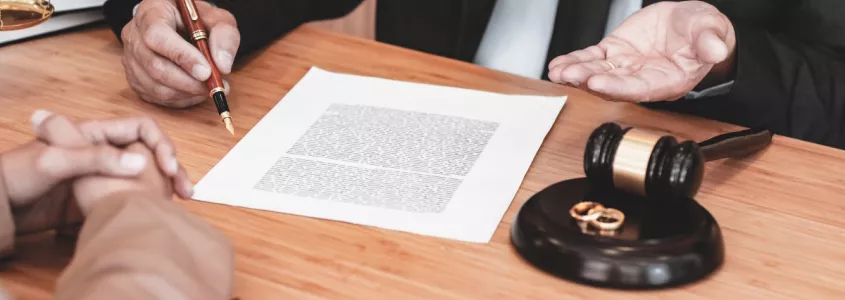
Table of contents
The divorce of a couple is a complicated time emotionally, sentimentally and financially. Especially if there are minor or disabled children involved.
At this time, many questions arise for both partners. One of the most common is who gets the house in a divorce. Therefore, we will answer this question in as much detail as possible.
The family home
In order to determine in a divorce who gets the house, the first thing to do is to define the concept of the family home. In this sense, the Civil Code establishes that it is "the habitual residence used by the couple during the marriage". In other words, the one in which the spouses maintain the family unit and spend the most time.
In the event of separation or divorce, it is necessary to attribute the use of the family home to one of the spouses in certain situations. Each of these situations has its own characteristics, which are set out in Article 96 of the Civil Code.
Allocation of the family home after a childless divorce
This case is typified in Article 96.2 of the Civil Code. In this sense, the text specifies that the use of the family home must be attributed to the spouse most in need of protection. Even if they were married in a regime of separation of property and the property was exclusively owned by the other spouse. The same also applies if they chose to form a community of property or were simply a common-law couple.
It should be noted that this can only apply if the couple have no children or if they are of legal age.
Allocation of the family home after a divorce with children
This is the first case of divorce with small children and family home that we want to analyse, as it is the most frequent in Spain. It is regulated in Article 96.1 of the Civil Code.
In this case, the use of the family home is attributed to the children and, therefore, to the custodial parent, i.e. the parent who has custody of the minors. This will be the case even if the home belongs exclusively to the non-custodial parent or to a third person. It should not be forgotten that the interest and protection of minors comes before any other issue in our legislation.
Shared custody
The second most frequent scenario when dealing with a case of marital separation and family home when there are children involved. This type of custody means that both parents will have custody during alternating periods of cohabitation.
This is the most complex situation of all, since the law does not contemplate what to do regarding the use of the family home when a shared custody regime is established. This is the reason why priority is given to the agreement between the parents. If this is not possible, it will be a judge who will decide how it is to be carried out, taking into account the circumstances. But, as always, the interests of the children will be the most important.
In any case, one of the following scenarios may occur:
- The family home is owned by both parents. They will then divide its use in alternating periods, while the children will always reside in it. When the financial situation of one of the parents requires protection, he/she will keep it exclusively, while the other parent will have to find another one.
- The family home is owned by only one parent. In this case, the use of the family home will only correspond to the owner or non-owner parent, depending on whether the latter needs more protection or not.
Partitioned, split or distributive custody
This is the least common type of custody, but it should still be mentioned. It is one in which, whenever there are two or more children, a decision is taken that part of the children will live with one parent and part with the other.
t is a situation where, whenever there are two or more children, a decision is taken that part of the children will live with one parent and the rest with the other. This is almost never the case, as it violates the right of the siblings to remain united.
In this case, the use of the family home will fall to the group most in need of protection as long as there is no agreement between the parties. As in the previous case, the Civil Code is silent on the matter, so the decision will have to be taken or ratified by a judge.
Other questions of interest
Before concluding, we would like to answer another frequently asked question: can the owner of the family home sell it without the consent of the other parent? If the non-owning spouse is the one who has custody of the children and has the right to use the property, the answer is no. If the non-owning spouse is the one who has custody of the children and has the right to use it, the answer is no. In order to do so, it will be necessary for a judge to re-examine the case and determine whether or not the special protection situation still exists.
In any case, whenever there is any doubt in this regard, it is advisable to contact a lawyer specialising in divorce. Moreover, it is essential to seek her advice before going through divorce proceedings. Only in this way will it be possible to guarantee the respective rights of the parents.

"Anywhere in Spain"
With our online appointment system you will have immediate advice without the need for face-to-face visits or travel.
One of our lawyers specialized in your area of interest will contact you to formalize an appointment and make your consultation by video call.
